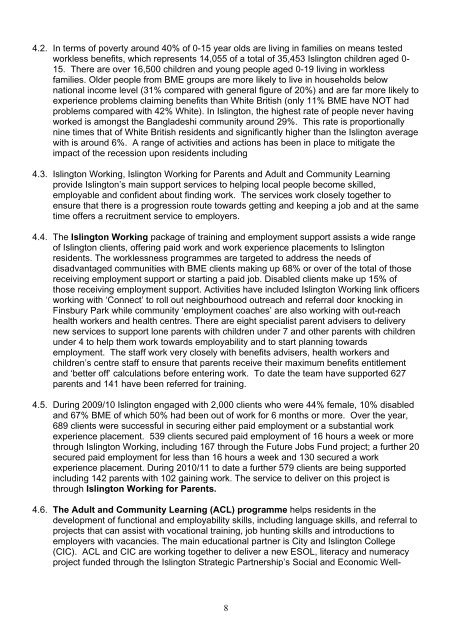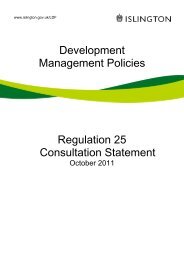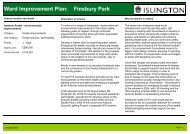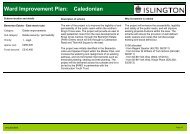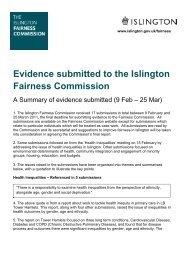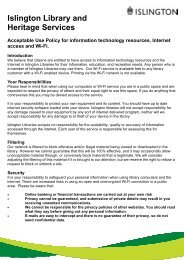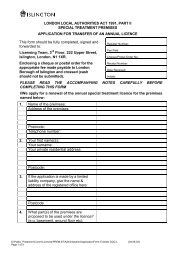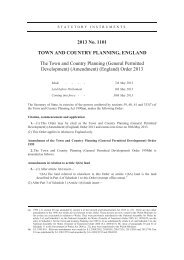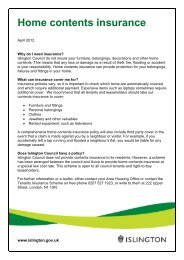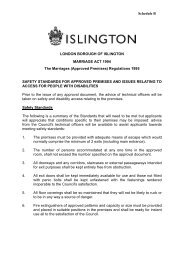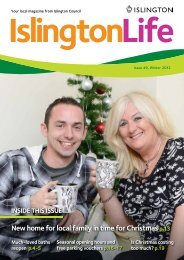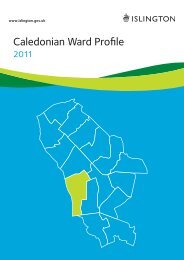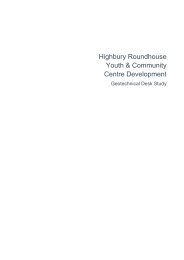Two Islingtons: Understanding the Problem - Islington Council
Two Islingtons: Understanding the Problem - Islington Council
Two Islingtons: Understanding the Problem - Islington Council
Create successful ePaper yourself
Turn your PDF publications into a flip-book with our unique Google optimized e-Paper software.
4.2. In terms of poverty around 40% of 0-15 year olds are living in families on means tested<br />
workless benefits, which represents 14,055 of a total of 35,453 <strong>Islington</strong> children aged 0-<br />
15. There are over 16,500 children and young people aged 0-19 living in workless<br />
families. Older people from BME groups are more likely to live in households below<br />
national income level (31% compared with general figure of 20%) and are far more likely to<br />
experience problems claiming benefits than White British (only 11% BME have NOT had<br />
problems compared with 42% White). In <strong>Islington</strong>, <strong>the</strong> highest rate of people never having<br />
worked is amongst <strong>the</strong> Bangladeshi community around 29%. This rate is proportionally<br />
nine times that of White British residents and significantly higher than <strong>the</strong> <strong>Islington</strong> average<br />
with is around 6%. A range of activities and actions has been in place to mitigate <strong>the</strong><br />
impact of <strong>the</strong> recession upon residents including<br />
4.3. <strong>Islington</strong> Working, <strong>Islington</strong> Working for Parents and Adult and Community Learning<br />
provide <strong>Islington</strong>’s main support services to helping local people become skilled,<br />
employable and confident about finding work. The services work closely toge<strong>the</strong>r to<br />
ensure that <strong>the</strong>re is a progression route towards getting and keeping a job and at <strong>the</strong> same<br />
time offers a recruitment service to employers.<br />
4.4. The <strong>Islington</strong> Working package of training and employment support assists a wide range<br />
of <strong>Islington</strong> clients, offering paid work and work experience placements to <strong>Islington</strong><br />
residents. The worklessness programmes are targeted to address <strong>the</strong> needs of<br />
disadvantaged communities with BME clients making up 68% or over of <strong>the</strong> total of those<br />
receiving employment support or starting a paid job. Disabled clients make up 15% of<br />
those receiving employment support. Activities have included <strong>Islington</strong> Working link officers<br />
working with ‘Connect’ to roll out neighbourhood outreach and referral door knocking in<br />
Finsbury Park while community ‘employment coaches’ are also working with out-reach<br />
health workers and health centres. There are eight specialist parent advisers to delivery<br />
new services to support lone parents with children under 7 and o<strong>the</strong>r parents with children<br />
under 4 to help <strong>the</strong>m work towards employability and to start planning towards<br />
employment. The staff work very closely with benefits advisers, health workers and<br />
children’s centre staff to ensure that parents receive <strong>the</strong>ir maximum benefits entitlement<br />
and ‘better off’ calculations before entering work. To date <strong>the</strong> team have supported 627<br />
parents and 141 have been referred for training.<br />
4.5. During 2009/10 <strong>Islington</strong> engaged with 2,000 clients who were 44% female, 10% disabled<br />
and 67% BME of which 50% had been out of work for 6 months or more. Over <strong>the</strong> year,<br />
689 clients were successful in securing ei<strong>the</strong>r paid employment or a substantial work<br />
experience placement. 539 clients secured paid employment of 16 hours a week or more<br />
through <strong>Islington</strong> Working, including 167 through <strong>the</strong> Future Jobs Fund project; a fur<strong>the</strong>r 20<br />
secured paid employment for less than 16 hours a week and 130 secured a work<br />
experience placement. During 2010/11 to date a fur<strong>the</strong>r 579 clients are being supported<br />
including 142 parents with 102 gaining work. The service to deliver on this project is<br />
through <strong>Islington</strong> Working for Parents.<br />
4.6. The Adult and Community Learning (ACL) programme helps residents in <strong>the</strong><br />
development of functional and employability skills, including language skills, and referral to<br />
projects that can assist with vocational training, job hunting skills and introductions to<br />
employers with vacancies. The main educational partner is City and <strong>Islington</strong> College<br />
(CIC). ACL and CIC are working toge<strong>the</strong>r to deliver a new ESOL, literacy and numeracy<br />
project funded through <strong>the</strong> <strong>Islington</strong> Strategic Partnership’s Social and Economic Well-<br />
8


